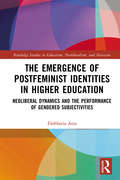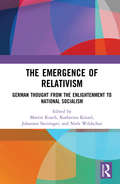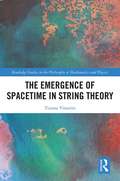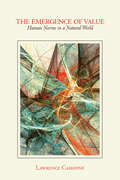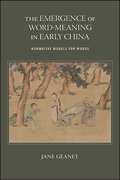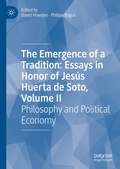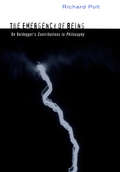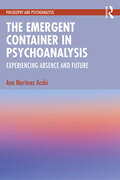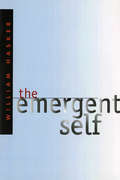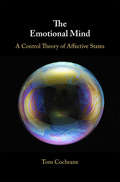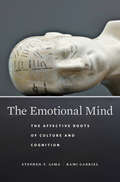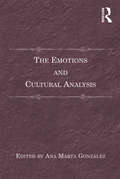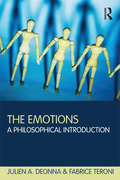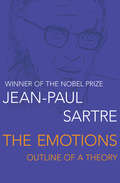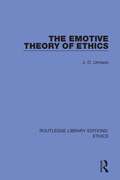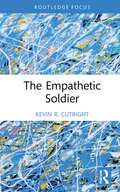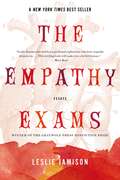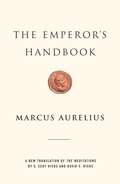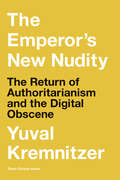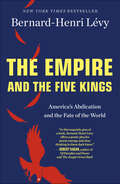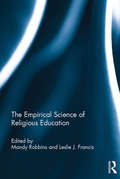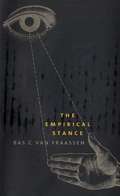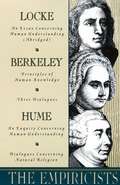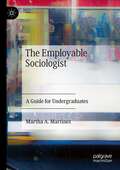- Table View
- List View
The Emergence of Postfeminist Identities in Higher Education: Neoliberal Dynamics and the Performance of Gendered Subjectivities (Routledge Studies in Education, Neoliberalism, and Marxism)
by Eleftheria AttaBy drawing on qualitative research conducted in universities in Cyprus, this book presents an account of life in the academy from a feminist perspective. In doing so, the texts uncover new gendered identities emerging as a result of neoliberal and postfeminist discourses in Higher Education. Adopting a psychosocial lens, and drawing on theories of affect and performativity, this volume explains academics’ responses to growing levels of stress, anxiety, precarity and competition in their professional environment. Chapters offer rich observation of how academic staff and faculty negotiate aspects of femininity and masculinity within the academy, and so highlights the performance of ‘gendered academic subjectivities’ as a way in which academics deal with increasing pressures and anxiety. Ultimately proposing a typography of emergent, affective identities including industry academics, fossilised, family and wannabe academics, the volume yields important insights into the current workings of Higher Education and shows the personal and professional impacts of neoliberal dynamics. This volume will prove to be a useful resource for researchers and high-level scholars in the fields of education, sociology of education and gender studies. More generally, scholars and academics with an interest in the changing face of contemporary Higher Education will find this book informative.
The Emergence of Relativism: German Thought from the Enlightenment to National Socialism
by Martin Kusch Katherina Kinzel Johannes Steizinger Niels WildschutDebates over relativism are as old as philosophy itself. Since the late nineteenth century, relativism has also been a controversial topic in many of the social and cultural sciences. And yet, relativism has not been a central topic of research in the history of philosophy or the history of the social sciences. This collection seeks to remedy this situation by studying the emergence of modern forms of relativism as they unfolded in the German lands during the "long nineteenth century"—from the Enlightenment to National Socialism. It focuses on relativist and anti-relativist ideas and arguments in four contexts: history, science, epistemology, and politics. The Emergence of Relativism will be of interest to those studying nineteenth- and twentieth-century philosophy, German idealism, and history and philosophy of science, as well as those in related disciplines such as sociology and anthropology.
The Emergence of Spacetime in String Theory (Routledge Studies in the Philosophy of Mathematics and Physics)
by Tiziana VistariniThe nature of space and time is one of the most fascinating and fundamental philosophical issues which presently engages at the deepest level with physics. During the last thirty years this notion has been object of an intense critical review in the light of new scientific theories which try to combine the principles of both general relativity and quantum theory—called theories of quantum gravity. This book considers the way string theory shapes its own account of spacetime disappearance from the fundamental level.
The Emergence of Value: Human Norms in a Natural World (SUNY series in American Philosophy and Cultural Thought)
by Lawrence CahoonePhilosophers, social scientists, and natural scientists argue over whether a natural scientific account of human being is compatible with uniquely human norms like ethics, justice, art, and the concern for truth. Many attempts at such an account have been tried and failed; others, like evolutionary psychology, have tried but stumbled. The Emergence of Value argues that a broad enough understanding of nature and human nature can incorporate human values and norms, without reducing them to inhuman processes. Lawrence Cahoone advances the position that nature includes values as well as facts, and human uniqueness is therefore compatible with nature, as it must be. To demonstrate this, we must consider multiple sciences and recent philosophical traditions and their impact on our notions of truth, morality, justice, and beauty.
The Emergence of Word-Meaning in Early China: Normative Models for Words (SUNY series in Chinese Philosophy and Culture)
by Jane GeaneyThe Emergence of Word-Meaning in Early China makes an innovative contribution to studies of language by historicizing the Chinese notion that words have "meaning" (content independent of instances of use). Rather than presuming that the concept of word-meaning had always existed, Jane Geaney explains how and why it arose in China. To account for why a normative term (yi, "duty, morality, appropriateness") came to be used for "meanings" found in dictionaries, Geaney examines interrelated patterns of word usage threading through and across a wide range of genres. These patterns show that by the first millennium, as textual production exploded—and as radically different writing forms (in Buddhist sutras) were encountered—yi already functioned as an externally accessible "model" for semantic interpretation of texts and sayings.The book has far-reaching implications. Because the idea of word-meaning is fundamental to theorizing, the book illuminates not only semantic ideas and the normativity of language in Early China, but also aspects of early Chinese philosophy and intellectual history. As the internet supplants one form of media (print), thereby reducing knowledge to vast digital databases, so too, this book explains, two thousand years ago a culture that prized oral and visual balance became an "empire of the text."
The Emergence of a Tradition: Philosophy and Political Economy
by David Howden Philipp BagusThis book, the second of two volumes, explores the impact of Jesús Huerta de Soto and his role in the modern revival of the Austrian School of Economics. Through chapters discussing philosophy and political economy, the nature of capitalism and the foundations of economics are examined in relation to Austrian economics. These ideas and the work of Huerta de Soto are also contextualized within the broader history of economic thought to provide insight into their influence and development.This book highlights and builds upon the intellectual legacy of Jesús Huerta de Soto through its contribution to the Austrian School of Economics. It will be relevant to students and researchers interested in Austrian economics, philosophy, and political economy.
The Emergency of Being
by Richard Polt"The heart of history, for Heidegger, is not a sequence of occurrences but the eruption of significance at critical junctures that bring us into our own by making all being, including our being, into an urgent issue. In emergency, being emerges. "-from The Emergency of Being The esoteric Contributions to Philosophy, often considered Martin Heidegger's second main work after Being and Time, is crucial to any interpretation of his thought. Here Heidegger proposes that being takes place as "appropriation. " Richard Polt's independent-minded account of the Contributions interprets appropriation as an event of emergency that demands to be thought in a "future-subjunctive" mode. Polt explores the roots of appropriation in Heidegger's earlier philosophy; Heidegger's search for a way of thinking suited to appropriation; and the implications of appropriation for time, space, human existence, and beings as a whole. In his concluding chapter, Polt reflects critically on the difficulties of the radically antirationalist and antimodern thought of the Contributions. Polt's original reading neither reduces this challenging text to familiar concepts nor refutes it, but engages it in a confrontation-an encounter that respects a way of thinking by struggling with it. He describes this most private work of Heidegger's philosophy as "a dissonant symphony that imperfectly weaves together its moments into a vast fugue, under the leitmotif of appropriation. This fugue is seeded with possibilities that are waiting for us, its listeners, to develop them. Some are dead ends-viruses that can lead only to a monolithic, monotonous misunderstanding of history. Others are embryonic insights that promise to deepen our thought, and perhaps our lives, if we find the right way to make them our own. "
The Emergent Container in Psychoanalysis: Experiencing Absence and Future (Philosophy and Psychoanalysis)
by Ana Martinez AcobiDrawing largely from the psychoanalytic ground of Jung, Bion and Winnicott, from Plato and Whitehead and from numerous clinical studies, this book explores ‘Absence’ and ‘Future’ in the context of their many emotional and conceptual meanings. Bringing together absence and future with Plato’s concept of the ‘receptacle’ as described in the Timaeus and with Whitehead’s handling of it, the author examines containment in psychoanalytic process. Here Jung’s concept of ‘container’ (Tavistock Lectures, 1935) is in an ancient and continuing tradition of process thinking. The term ‘emergent container’ has been coined as the metaphorical and metaphysical space where the interplay between potentiality and actuality meet in the process of emergent reality. As absence emerges, experience consciousness develops, as well as the potential for symbolic thinking. In this sense, the experience of absence is considered as a potential container for and of creativity. If absence does not emerge as experience, there often follows the compulsion to fill emptiness with hallucination. Absence as it plays into the experience of containment is a key factor in the developmental and psychoanalytic process. The Emergent Container in Psychoanalysis offers an exciting prospect for further research by psychotherapists and philosophers interested in the field of contemporary psychoanalytic thinking within and beyond their discipline. The book is also of great value to the inquisitive reader open to an exploration of human nature not confined to a single body of knowledge.
The Emergent Self
by William HaskerIn The Emergent Self, William Hasker joins one of the most heated debates in analytic philosophy, that over the nature of mind. His provocative and clearly written book challenges physicalist views of human mental functioning and advances the concept of mind as an emergent individual. Hasker begins by mounting a compelling critique of the dominant paradigm in philosophy of mind, showing that contemporary forms of materialism are seriously deficient in confronting crucial aspects of experience. He further holds that popular attempts to explain the workings of mind in terms of mechanistic physics cannot succeed. He then criticizes the two versions of substance dualism most widely accepted today--Cartesian and Thomistic--and presents his own theory of emergent dualism. Unlike traditional substance dualisms, Hasker's theory recognizes the critical role of the brain and nervous system for mental processes. It also avoids the mechanistic reductionism characteristic of recent materialism. Hasker concludes by addressing the topic of survival following bodily death. After demonstrating the failure of materialist views to offer a plausible and coherent account of that possibility, he considers the implications of emergentism for notions of resurrection and the afterlife.
The Emotional Mind: A Control Theory of Affective States
by Tom CochraneIn this book, Tom Cochrane develops a new control theory of the emotions and related affective states. Grounded in the basic principle of negative feedback control, his original account outlines a new fundamental kind of mental content called 'valent representation'. Upon this foundation, Cochrane constructs new models for emotions, pains and pleasures, moods, expressive behaviours, evaluative reasoning, personality traits and long-term character commitments. These various states are presented as increasingly sophisticated layers of regulative control, which together underpin the architecture of the mind as a whole. Clearly structured and containing numerous diagrams and examples to illustrate the discussion, this study draws on the latest research from fields including philosophy, psychology and neuroscience, and will appeal to readers interested in the philosophy and cognitive science of emotion.
The Emotional Mind: The Affective Roots of Culture and Cognition
by Stephen T. AsmaFor 200 million years before humans developed a capacity to reason, the emotional centers of the brain were hard at work. Stephen Asma and Rami Gabriel help us understand the evolution of the mind by exploring this more primal capability that we share with other animals: the power to feel, which is the root of so much that makes us uniquely human.
The Emotions and Cultural Analysis
by Ana Marta GonzálezAmidst prevailing debates that construe rationality and emotionality as polar opposites, this book explores the manner in which emotions shape not only prevailing conceptions of rationality, but also culture in general terms, making room for us to speak of an 'emotional culture' specific to late-modern societies. Presenting case studies involving cultural artefacts, narratives found in fictional and non-fictional literature and television programs, speech patterns and self-talk, fashion, and social networking practices, The Emotions and Cultural Analysis sheds light on the relationship between emotion and culture and the ways in which emotion can be harnessed for the purposes of cultural analysis. An interdisciplinary volume containing the latest research from sociology, philosophy, literary studies, linguistics, and communication, this book will be of interest to those working on the sociology and philosophy of emotion, cultural studies, and cultural theory.
The Emotions: A Philosophical Introduction
by Fabrice Teroni Julien DeonnaThe emotions are at the centre of our lives and, for better or worse, imbue them with much of their significance. The philosophical problems stirred up by the existence of the emotions, over which many great philosophers of the past have laboured, revolve around attempts to understand what this significance amounts to. Are emotions feelings, thoughts, or experiences? If they are experiences, what are they experiences of? Are emotions rational? In what sense do emotions give meaning to what surrounds us? The Emotions: A Philosophical Introduction introduces and explores these questions in a clear and accessible way. The authors discuss the following key topics: the diversity and unity of the emotions the relations between emotion, belief and desire the nature of values the relations between emotions and perceptions emotions viewed as evaluative attitudes the link between emotions and evaluative knowledge the nature of moods, sentiments, and character traits. Including chapter summaries and guides to further reading, The Emotions: A Philosophical Introduction is an ideal starting point for any philosopher or student studying the emotions. It will also be of interest to those in related disciplines such as psychology and the social sciences.
The Emotions: Outline of a Theory
by Jean-Paul SartreOne of the leading twentieth-century French existentialist philosophers examines how human emotions shape our existence. In The Emotions: Outline of a Theory, French philosopher Jean-Paul Sartre attempts to understand the role emotions play in the human psyche. Sartre analyzes fear, lust, anguish, and melancholy while asserting that human beings begin to develop emotional capabilities from a very early age, which helps them identify and understand the emotions&’ names and qualities later in life. Helping to complete the circle of Sartre&’s many theories on existentialism, this vital piece of literature is a must-have for the philosopher-in-training&’s collection.
The Emotions: Outline of a Theory
by Jean-Paul SartreOne of the leading twentieth-century French existentialist philosophers examines how human emotions shape our existence. In The Emotions: Outline of a Theory, French philosopher Jean-Paul Sartre attempts to understand the role emotions play in the human psyche. Sartre analyzes fear, lust, anguish, and melancholy while asserting that human beings begin to develop emotional capabilities from a very early age, which helps them identify and understand the emotions&’ names and qualities later in life. Helping to complete the circle of Sartre&’s many theories on existentialism, this vital piece of literature is a must-have for the philosopher-in-training&’s collection.
The Emotive Theory of Ethics
by J. O. UrmsonOriginally published in 1968, this book traces the development of the emotive theory of ethics from its outline by Ogden and Richards in The Meaning of Meaning to the elaborate presentation by Stevenson in Ethics and Language. Attention is paid to the positive features of the ethical theory whilst the author also shows how a more adequate view can be reached through critical reflection on it.
The Empathetic Soldier (War, Conflict and Ethics)
by Kevin R. CutrightThis book shows the contribution that empathy can and should make to the proper conduct of war. US Army doctrine identifies empathy as an essential trait in soldiers; despite this endorsement of senior leaders, empathy’s role in the military profession remains obscure. The notion of soldiers empathetically considering others, especially enemies, strikes many as counter to the nature of soldiering. Additionally, confusion caused by differing definitions of empathy often leads to its complete dismissal. This work clarifies the concept by considering recent philosophical, psychological, and neuroscientific research, and demonstrates the relevance of empathy to the tactical and strategic demands of war. Empathy amplifies soldiers’ understanding of human actors in an operational environment, enables soldiers’ critical and creative thinking, and improves their overall intentions, planning, and assessments of a war’s progress. While empathy can make soldiers more susceptible to the psychic wound of moral injury, it also helps prevent and overcome this injury. Instead of dismissing it, soldiers should assimilate empathy into their moral frameworks. This book will be of much interest to students of the ethics of war, psychology, and military studies generally.
The Empathy Exams: Essays
by Leslie JamisonFrom personal loss to phantom diseases, The Empathy Exams is a bold and brilliant collection, winner of the Graywolf Press Nonfiction PrizeA Publishers Weekly Top Ten Essay Collection of Spring 2014Beginning with her experience as a medical actor who was paid to act out symptoms for medical students to diagnose, Leslie Jamison's visceral and revealing essays ask essential questions about our basic understanding of others: How should we care about each other? How can we feel another's pain, especially when pain can be assumed, distorted, or performed? Is empathy a tool by which to test or even grade each other? By confronting pain—real and imagined, her own and others'—Jamison uncovers a personal and cultural urgency to feel. She draws from her own experiences of illness and bodily injury to engage in an exploration that extends far beyond her life, spanning wide-ranging territory—from poverty tourism to phantom diseases, street violence to reality television, illness to incarceration—in its search for a kind of sight shaped by humility and grace.
The Emperor's Handbook: A New Translation Of The Meditations
by Marcus Aurelius C. Scot Hicks David V. Hicks David HicksIn the tradition ofThe Art of Living and Marcus Aurelius' Meditations--a practical book of timeless advice from one of the most powerful individuals in history--available for the first time in a highly accessible translation, including several unique features for contemporary readers and users of daily wisdom guides. Essayist Matthew Arnold described the man who wrote these words as "the most beautiful figure in history. " Possibly so, but he was certainly more than that. Marcus Aurelius ruled the Roman Empire at its height, yet he remained untainted by the incalculable wealth and absolute power that had corrupted many of his predecessors. Marcus knew the secret of how to live the good life amid trying and often catastrophic circumstances, of how to find happiness and peace when surrounded by misery and turmoil, and of how to choose the harder right over the easier wrong without apparent regard for self-interest. The historian Michael Grant praises Marcus's book as "the best ever written by a major ruler," and Josiah Bunting, superintendent of the Virginia Military Institute, calls it "the essential book on character, leadership, duty. " Never intended for publication, the Meditations contains the practical and inspiring wisdom by which this remarkable emperor lived the life not of a saintly recluse, but of a general, administrator, legislator, spouse, parent, and judge besieged on all sides. The Emperor's Handbook offers a vivid and fresh translation of this important piece of ancient literature. It brings Marcus's words to life and shows his wisdom to be as relevant today as it was in the second century. This book belongs on the desk and in the briefcase of every business executive, political leader, and military officer. It speaks to the soul of anyone who has ever exercised authority or faced adversity or believed in a better day.
The Emperor's New Nudity: The Return of Authoritarianism and the Digital Obscene (Short Circuits)
by Yuval KremnitzerAn analysis of contemporary authoritarianism and the medium in which it flourishes, the internet, as well as what lies at the complex intersection of authority and technology.In recent decades, a new style of authoritarian politics has taken hold throughout the liberal-democratic world. The new authority figures are characterized by obscene, transgressive behavior, reminiscent of the &“crowd&” leader as theorized by Freud, only far less transient. In The Emperor's New Nudity, Yuval Kremnitzer considers the fraught intersection of authority and technology—the internet being the medium that has allowed contemporary authoritarianism to thrive—asking foundational questions such as: How can we think of the network as a social phenomenon? What can social and political phenomena teach us about the nature of the new technology? And how does technology reshape the very fabric of social and political life?Technology, Kremnitzer writes, leads us toward an impersonal and hyperrational world to such an extent that it renders human subjectivity outmoded. Authority, on the other hand, anchors our subjective identifications to certain figures and seems to be hopelessly primitive and irrational. What is required, then, is a dialectics of the primal—a study of the way in which what strikes us as essential enters into the dynamics of historical change. From this perspective, authority and technology can be said to be divided by a common object—the unwritten law, and the special knowledge that pertains to it: a knowledge without knowers.
The Empire and the Five Kings: America's Abdication and the Fate of the World
by Bernard-Henri LévyOne of the West’s leading intellectuals offers a provocative look at America’s withdrawal from world leadership and the rising powers who seek to fill the vacuum left behind.The United States was once the hope of the world, a beacon of freedom and the defender of liberal democracy. Nations and peoples on all continents looked to America to stand up for the values that created the Western worldand to oppose autocracy and repression. Even when America did not live up to its ideals, it still recognized their importance, at home and abroad.But as Bernard-Henri Lévy lays bare in this powerful and disturbing analysis of the world today, America is retreating from its traditional leadership role, and in its place have come five ambitious powers, former empires eager to assert their primacy and influence. Lévy shows how these five—Russia, China, Turkey, Iran, and Sunni radical Islamism—are taking steps to undermine the liberal values that have been a hallmark of Western civilization.The Empire and the Five Kings is a cri de coeur that draws upon lessons from history and the eternal touchstones of human culture to reveal the stakes facing the West as America retreats from its leadership role, a process that did not begin with Donald Trump's presidency and is not likely to end with him. The crisis is one whose roots can be found as far back as antiquity and whose resolution will require the West to find a new way forward if its principles and values are to survive.As seen on Real Time with Bill Maher (2/22/2019) and Fareed Zakaria GPS (2/17/2019).
The Empirical Science of Religious Education
by Mandy Robbins Leslie J. FrancisThe Empirical Science of Religious Education draws together a collection of innovative articles in the field of religious education which passed the editorial scrutiny of Professor Robert Jackson over the course of his impactful fourteen year career as editor of the British Journal of Religious Education. These articles have made an enormous contribution to the international literature establishing of the empirical science of religious education as a research field. The volume draws together, organises and illustrates the contours of this emerging field and is an essential compendium which covers work in: teacher education and teacher experience; student understanding, attitudes and values; varieties of religious schooling, and; worldview and life interpretation Organised into ten thematic sections the contributors cover the field comprehensively and bring with them an international and reflexive approach to their research. It is an essential resource for those practitioners and researchers who wish to access original and innovative research undertaken by way of ethnographic fieldwork, practitioner research, life-history approaches to research, psychological scales and measures, and large surveys. Particularly interested readers will be studying PGCE and masters level programmes in religious education, as well as qualified religious educators undertaking continuing professional development.
The Empirical Stance
by Bas C. Van Fraassen"What is empiricism and what could it be? Bas C. van Fraassen, one of the world's foremost contributors to philosophical logic and the philosophy of science, here undertakes a fresh consideration of these questions and offers a program for renewal of the empiricist tradition. The empiricist tradition is not and could not be defined by common doctrines but embodies a certain stance in philosophy, van Fraassen says. This stance is displayed first of all in a searing recurrent critique of metaphysics, and second in a focus on experience that requires a voluntarist view of belief and opinion. "--BOOK JACKET. Title Summary field provided by Blackwell North America, Inc. All Rights Reserved
The Empiricists: Locke: Concerning Human Understanding; Berkeley: Principles of Human Knowledge & 3 Dialogues; Hume: Concerning Human Understanding & Concerning Natural Religio
by David Hume John Locke George BerkeleyThis volume includes the major works of the British Empiricists, philosophers who sought to derive all knowledge from experience. All essays are complete except that of Locke, which Professor Richard Taylor of Brown University has skillfully abridged.
The Employable Sociologist: A Guide for Undergraduates
by Martha A. MartinezThis book addresses a gap in and outside academia: how to help Sociology undergraduates develop skills for career success while maintaining a sociologically rigorous approach. Matching sociological theories, methods, and knowledge with contemporary capitalistic managerial and work practices, it shows how sociology undergraduates are not only employable but have marketable advantages over graduates of other disciplines. A student following the program embodied in this book will actively nurture a strong sociological identity; create a job search plan integrating personal and disciplinary interests, values, and skills; design job application materials that provide the best fit for specific jobs and organizations; and launch a satisfying career path. Beyond an employment guide, it will facilitate the teaching of career development by Sociology faculty; increase students’ ongoing confidence in their potential; and provide a solid foundation for communicating the transformative power of Sociology to employers and managers in the government, business, and non-profit sectors.
